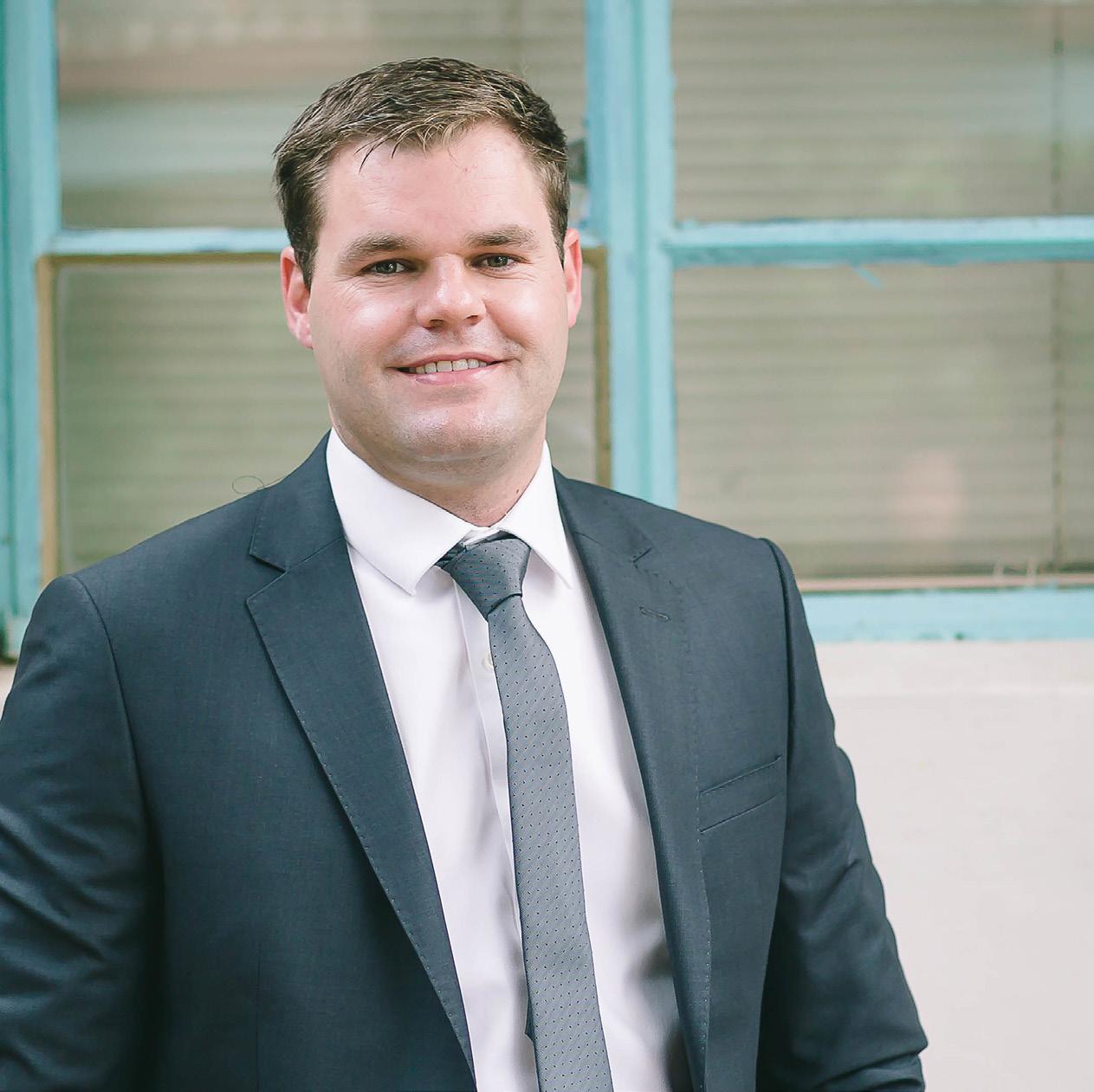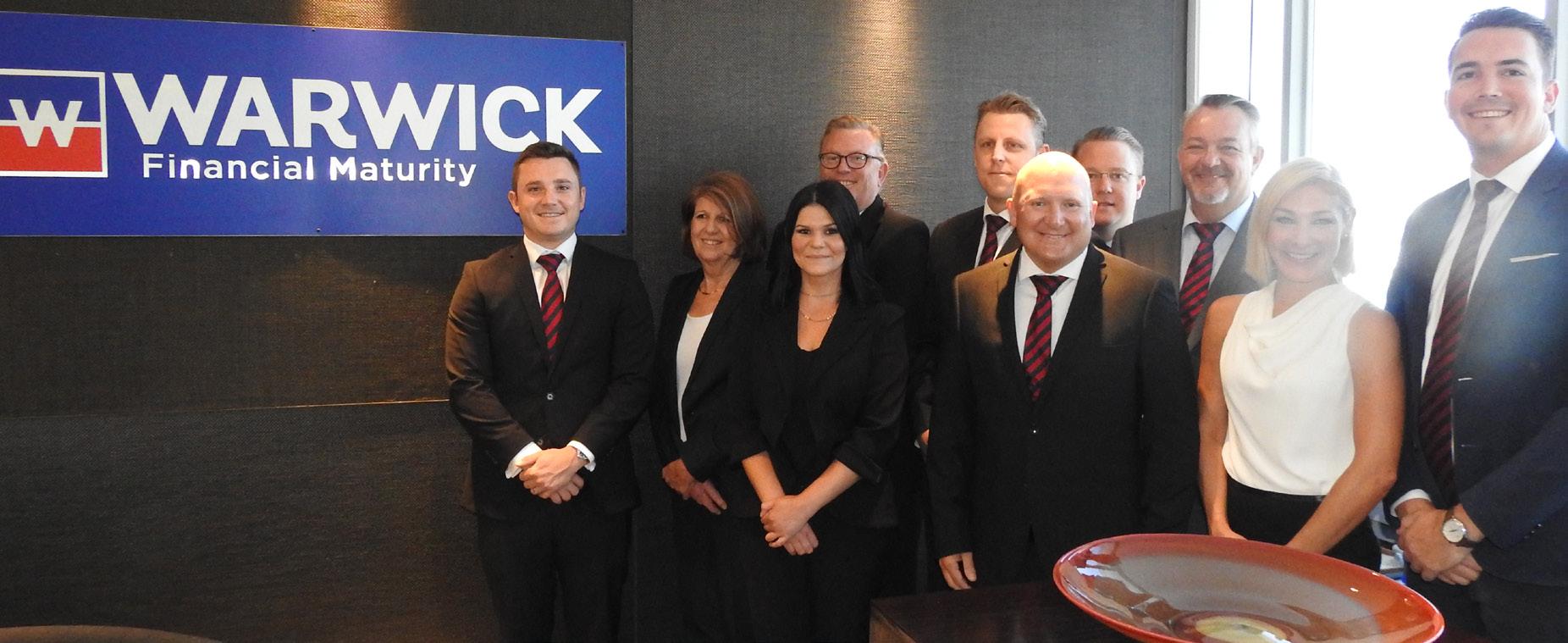
15 minute read
FSCA Regulators, Educators and Innovators
INDUSTRY FOCUS: FINANCE
CHANGE IN SCOPE
“Despite the FSB’s successes, there was a clear need for South Africa to have a dedicated conduct regulator that would ensure that financial institutions prioritise treating their customers fairly,” explains Tembisa Marele, Head of Communications at the FSCA.
“The FSCA not only regulates how financial firms conduct themselves, but also empowers customers to make better financial decisions,” she goes on. “As part of our strategy, our mandate as a conduct regulator is to promote fair customer outcomes, provide financial education and assist in maintaining financial stability in South Africa.
“The FSCA’s prioritisation of financial inclusion is not just about increasing consumer access to financial products and services as an end,” Marele clarifies. “We want and need to ensure that this access enables South Africans to use appropriate financial products that meet their needs and improve their quality of life.”
The FSCA has a much broader remit than the FSB enjoyed, with oversight of financial products and services like banking, services related to credit, and the buying and selling of foreign exchange. “This requires a shift in approach from the FSB’s traditional compliance driven model to one that is proactive, pre-emptive, risk-based and outcomes focused,” Marele impresses.
The scale of the change required has been significant, impacting how the FSCA is structured, resourced and skilled as well as how regulatory and supervisory frameworks are designed. “In this time,” Marele describes of the changeover, “we made key appointments to the executive team, provided support in the development of primary legislation, drafted and published several regulatory instruments and assisted the industry to navigate the changes in regulation and legislation.
“We also prioritised engagements with our key stakeholders, as it remains our belief that it is only through a collaborative approach that we can effectively regulate the sector.” Marele is conservative, even

humble in her assessment of the FSCA’s impact to date, but it has been keenly felt throughout the industry.
“We should look at the industry and its milestones in terms of whether or not it’s treating its customers fairly, and while there is some progress, it remains something that needs to continuously be prioritised and scrutinised.
“The concept of treating customers fairly is not new to the industry and for the past seven years we have sought to entrench it. Although we continue to see progress, our efforts have been intensified under the FSCA.”


INDUSTRY FOCUS: FINANCE
EDUCATION AND INNOVATION
One important aspect of the FSCA’s mandate requires it to provide education to financial customers and promote financial literacy and inclusion, which drives its consumer education strategy. Marele goes on to describe the form that this takes. “We are working to develop best practice for the monitoring and evaluation of the impact of consumer education initiatives undertaken by the financial services sector,” she delineates.
“We want to drive industry initiatives that are better coordinated to maximise the impact of the sector’s spend on financial education, and ensure that this leads to changes in the behaviour of South Africans when it comes to money.
“We’ve partnered with the Department of Public Works to provide financial literacy to participants of the Expanded Public Works Programme (EPWP), and we’re coordinating national financial education projects such as Money Smart Week and the Financial Literacy Schools Speech Competition,” Marele adds, by way of illustration.
Perhaps chief among the imminent causes of excitement for Marele is the FSCA’s Fintech Innovation Hub, which, in partnership with the South African Reserve Bank (SARB), will see the body collaborate with all other regulators in the Fintech sector to create solutions for the South African market.
“The decision to follow a multi-regulator approach to the regulation of Fintechs uses an agile and design-thinking approach,” says Marele, “which has culminated in the impending establishment of the Innovation Hub.
“The idea is to facilitate innovation in the sector in a manner that is coordinated, collaborative and controlled.”
The Hub will be used as a vehicle to engage with the Fintech ecosystem,

enabling regulators to craft new policies and innovate. “The Hub encompasses a Regulatory Guidance Unit, which is the first entry point for Fintech firms to obtain support in navigating the regulatory landscape and data and insights from the Unit will inform policy development,” Marele expands.
“There will also be a Regulatory Sandbox that will provide a live testing environment, that balances the risks
FSCA
and benefits of introducing innovative solutions to the market and which cannot be addressed within the current regulatory framework. An Innovation Accelerator will drive innovation, with common benefits across participating regulators and solutions.
“Additionally, an Internal Innovation Function will be owned by each regulator and will interface with the Innovation Hub. This is where

disruptive technologies and leading practices identified in the Hub will be recommended for consideration by individual regulators.”
Fintech is recognised to be rapidly transforming the essence of global financial services, and no more is it in evidence than in the SA space. South Africa has been posited as the Fintech capital of the continent, with the industry managing to grow its investment value from $15 million to $170 million in 2018, and continuing this positive trajectory in 2019.
Marele is in absolute accordance with the suggestion of a fundamental shift towards the widespread integration of technology into the sector moving forward. “There are currently 217 active operational Fintech companies in South Africa operating across eight of the subsegments,” she says. “Some Fintechs operate across more than one segment which increases the total number of Fintechs to 224. These were founded in the last eleven years and the number is expected to grow as the adoption of technology increases.
“In the future, financial regulators will be faced with the challenge of achieving a balance between supporting innovation, and managing the potential risk they pose,” Marele warns of the flip side to the many opportunities such endeavours present.
“They are imperative to supporting Fintech growth, but at the same time we must maintain a stable financial system.” This is really the essence of the FSCA: doing everything in its power to educate and facilitate the needs of consumers, while keeping the all-important equilibrium to ensure the continued success of one of South Africa’s true success sectors.
WWW.FSCA.CO.ZA

WARWICK WEALTH
Invest With The Specialists

PRODUCTION: Colin Chinery
Exceptional client-centricity focussed on the lucrative lifestyle segment has seen international wealth management specialists Warwick Wealth become one of the South Africa’s fastest growing financial planning operations. And the momentum continues. “I believe the next 10 years will become the most successful in this company’s history,” says Managing Director Marc Wiese.
INDUSTRY FOCUS: FINANCE
// To trace the link between an oval ball, a croquet mallet, a four ace bridge hand and high net worth investing, reach back to a period house on an old 17th century wine estate in Constantia, Cape Town.
It was here in 2002 that Ian Kilbride and Steve Wallace formed international wealth management specialists Warwick Wealth. Now, with offices in Cape Town, Claremont, Constantia – as well as Johannesburg, Durban, Port Elizabeth, Knysna and East London – the established investment operation offers a range of bespoke financial products, delivering arguably the best client service in South Africa.
Exceptional client-centricity is a Warwick hallmark, a management ethos driven not by merely selling a product, fund or unit trust, but by analysing specific financial needs and each client receiving a bespoke investment plan.

HOLISTIC PLANNING
“Right from the start the focus was on conducting financial planning in a holistic way, the wealth of high net worth individuals and those with some degree of disposable income. That was where the niche was,” says Group Director of Corporate Affairs, Professor Tim Hughes.
And along with that niche, and closely identified with it, was another.
“What Ian and Steve had identified - and this was important in South Africa - was a kind of lifestyle market, people who played bowls, golf, or bridge, and so forth. And so the market for Warwick almost identified itself.”
Sport is in the DNA of Ian Kilbride, a Lancastrian who settled in South Africa in 1990. His father had played Rugby League, while Kilbride is a supporter of Everton Football Club, still travelling the 6000 miles from Cape Town to watch his Merseyside favourites – “supporting Liverpool Football Club is one of the deadly sins!”
The genesis of Warwick – named after the English university where Kilbride graduated – was Appleton, the private client asset management he formed in 1992, with offices in Johannesburg, Durban, Port Elizabeth and Cape Town, and listed on the JSE seven years later.
Appleton, together with Cadiz Asset Management and Warwick Wealth Management are today housed under the Spirit Invest holding company, managing and administrating over $3bn of client assets, and of which Kilbride is Executive Chairman.
WARWICK WEALTH
UNIQUE PRODUCTS AND SERVICE
Warwick is focused on unique products and service levels designed for the client wanting quality and professionalism.
Initially, each client meets with a qualified Warwick professional to
determine their specific financial needs and requirements. “We are the closest I think you will get in South Africa, to a private banking operation,” says Hughes.
“Our entire business model is about applying a very direct, personalised tailored service to the individual client, looking at the particular financial and income needs and specific risk profile.
“Altogether a holistic view of the client, with Warwick constructing financial products and offerings around it.”
WARWICK LIFESTYLE
The Client Network is one of three Warwick operational arms, with a second, the Lifestyle network, one of the biggest sponsors of grass-roots sports and lifestyle institutions in South Africa, sponsoring between 200 and 600 different sports events a year, including bowls, golf, rugby, croquet, bridge, running and cycling.
Formed in 2002, Warwick Lifestyle is the largest network of its kind anywhere in Africa, with several hundred sports, recreational and social clubs, along with retirement villages and other senior associations.
“We have built long standing relationships with clubs, some running almost 20 years,” says Warwick Managing Director Marc Wiese.
“We have established our brand, and reputation for what we can do for clients. We have built a great client base, and this will continue to be a large focus for our business going forward.”
The third - and one which Wiese believes will supply Warwick with the bulk of its planned distribution and growth over the next decade - is Warwick’s Professional Network.
Comparing apples with apples?
Specialists in personal foreign exchange
We can assist you with your international money transfers, offering a superior service that our clients appreciate. • Exceptional rates • Market orders • Foreign currency accounts • Tax clearances • Offshore bank accounts

Proud partner of Warwick Wealth
Contact one of our dealers today on 087 135 5978
Cape Town | Port Elizabeth | Plettenberg Bay | Durban | Kimberley | Johannesburg | Pretoria
www.currencyassist.com info@currencyassist.com
Currency Assist SA (Pty) Ltd is a foreign exchange service provider authorised with the FSCA under FSP license number 46057.
INDUSTRY FOCUS: FINANCE
“If you look after your clients very well you retain your client base. That is great. But from there we want to grow. We are one of the fastest growing financial services in South Africa, and we are very ambitious.”
PROFESSIONAL NETWORK
Launched in 2007, the Professional Network is Warwick’s direct link to the thousands of industry professionals working throughout South Africa and around the world, a vast network of Independent Financial Advisors (IFA’s) and other professionals aligned with Warwick through its Succession, Intermediary, Advisory and Merger plans.
Of these, the most important is Succession Planning, says Wiese. “We believe the average IFA is older than 55, with those coming in from a new and Marc Wiese, MD Warwick

younger generation far less than many years ago.”
Despite an exceptionally attractive basic salary plus progression incentives package, Warwick finds direct recruiting of appropriately qualified, ambitious, young professionals highly challenging.
RECRUITING CHALLENGES
“Over the past ten years in particular, it’s become increasingly difficult to find really good people of the right calibre and qualities and yet the quality of our wealth specialists improves every year.
“We have an expansion drive in Johannesburg to secure more wealth specialists, and the latest we appointed there was late last year.
“After narrowing down from way over 100 applications we went through
58 interviews, and only one was of the right calibre for Warwick. We won’t appoint for the sake of appointing.”
So Succession Planning and mergers are the dual keys to operational growth. “We offer by far the best succession planning deal for IFAs looking to exit the industry or retire.
“We estimate there is going to be in excess of R100b to potentially up to R400b IFA investment books looking to retire.
“This, along with mergers, gives us a tremendous opportunity of extending a structured approach, meeting each client face to face, explaining the benefits, and slowly but surely, transitioning them and meeting their financial planning needs.
“The other offering we have within the Professional Network, is our Intermediary plan, an opportunity to partner with Warwick and earn a regular passive income through building a bespoke financial investment strategy.”
With more than 100 staff at offices in Cape Town, Durban, Johannesburg, Port Elizabeth, East London, and Knysna in the Western Cape, Warwick is looking to expand over the next few years to other cities including Bloemfontein, Pietermaritzburg, and Pretoria.
BEYOND SA?
Expansion beyond South Africa’s borders however is more challenging.
“There are very clear opportunities in major growth points such as Nairobi, Dar es Salaam, Lagos, Kampala where there are high networth individuals looking for the type of service we can offer,” says Professor Hughes.
“The opportunities are there, and while you don’t actually need a bricks and mortar presence, the one constraint is our model of being highly personalised, and providing that faceto-face type of service.
“A number of financial services companies have extended their operations outside South Africa, and frankly the record and picture is very mixed. And we want to make sure we get it right.”
WARWICK WEALTH
The Warwick Cape Town Sales Team

Meantime, “enormous opportunities within the financial services industry over the next five and potentially ten years” means South Africa will continue to be the company’s core focus, says Wiese
“After say three or five years we will be looking at Africa – likely to become one of the big hubs at some stage in the future - as well as potentially the UK, where we already have a presence, and Australia, both of whose financial service regulation models are very similar to South Africa’s. Mauritius is another we have in view.”
If territorial expansion is active on the Warwick planner, investment, outsourcing is very much in the here and now.
OUTSOURCING = STABILITY
“One of the cornerstones of investing is diversification, and this includes different jurisdictions,” says Wiese.
“I still think there’s a lot of value in South Africa, which is an amazing country. But for high net worth individuals to have a bulk of their wealth invested in an economy and stock market that makes up less than 1% of the world economy and stock market, will certainly not provide them with that required diversification.”
Warwick anticipated this trend four years ago, says Hughes, with an executive decision to externalise client’s funds, sometimes as much as 50%.
“This means our clients have been enjoying real currency returns and growth from our international portfolio.”
Wiese cites a company declaration that ‘Warwick as a nationally-based financial services organisation provides on average, the best client service in South Africa.’ “That’s our statement, and I stand by that.”
Recalling that seven years ago Warwick went through a period of substantial growth, he says the last three or four have been one of enormous investment some consolidation, “building an exceptionally scalable model that will give us further growth over the next five to ten years.
EXCEPTIONAL GROWTH
“Last year was a tough time in the market, yet we had exceptional growth, and going into 2020 we are taking on several fairly large independent financial advice businesses. Growth for this year is pretty much set there.
“I think the industry is going to go through an enormous change over the next ten years, and I believe that these will become the most successful ten years in this company’s history.”
The Warwick MD’s comments are a refreshing counterpoint to a New Year survey showing consumer sentiment remaining at a two-year low, with household budgets increasingly constrained by slow wage growth, high tax rates, and soaring electricity prices.
“Even if the economy struggles and things are tough out there, I think in some senses it allows us even better opportunities because clients are looking for something special.
“When things are tough, they start asking difficult but important questions. And that’s where Warwick can provide the answers.”
WWW.WARWICKWEALTH.COM


